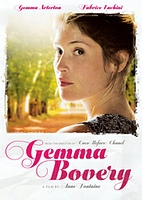Little Known Films: Gemma Bovery
Oh, to be beautiful and bored. It has been over 150 years since Gustave Flaubert shocked the world with “Madame Bovary,” his groundbreaking book about a provincial doctor’s wife who embarks on a tragic affair to escape her dull, routine life. And ever since, the character of Emma Bovary has become both a literary and cinematic archetype, fueling an entire subgenre of stories about women looking to escape their circumstances, only to find hard consequences following dalliances outside their marriage and home. It’s a story that still resonates today.
Based on the graphic novel by Posy Simmonds, the slightly reinvented story is told in flashback through the eyes of Martin Joubert (Fabrice Luchini), as he reads Gemma’s (Gemma Arterton) diaries, which intermingle with his own memories of what happens to the beautiful young woman. A baker in Normandy, Martin, his wife and teenage son, live across from Gemma, who moves from London with her new husband Charles (Jason Flemyng) and shakes loose in the bread maker what he describes as “ten years of sexual tranquility.”
His entreating and yearning eyes toward Gemma betray a passion stirred both from genuine lust but also a personal love for Flaubert’s novel, which changed his life when he was sixteen, and soon he’s quietly watching her from a distance as she makes a series of decisions reminiscent of the character in the great novel. Gemma, a sexually aware ingénue alienated by an inability to master the French language and the idiosyncrasies of her new surroundings, is easy prey for Martin’s literary hunger. She’s swayed and affected by the smallest things, such as being told that she has a muffin top by a skinny neighbor obsessed with the fitness equipment that everyone in L.A. has, which triggers her to immediately begin jogging. The pleasures and the humor of the film lie precisely in the incidents which don’t coincide with the novel.
Sumptuously directed by Anne Fontaine (Coco Before Chanel) Gemma Bovery dabbles in the French romantic-comedy tradition and simultaneously spoofs it, committing to neither.


